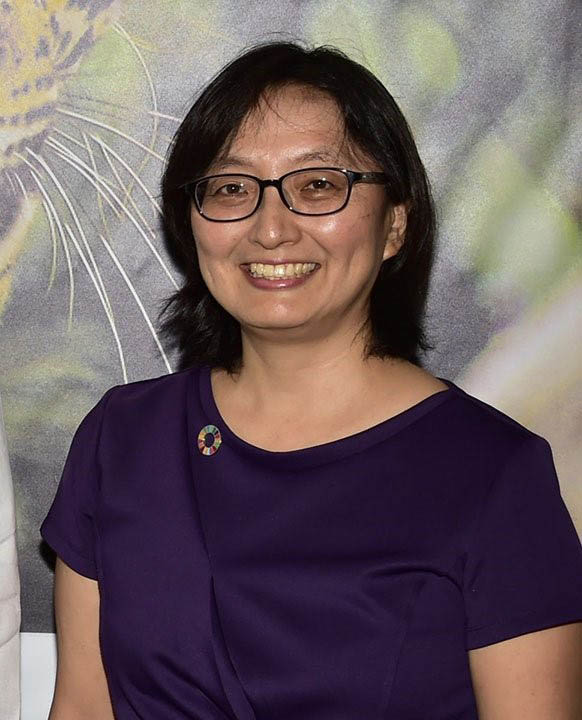In a major statement on the political situation here, United Nations (UN) Resident Coordinator Mikiko Tanaka has said that given the slim margin in the legislature between the government and opposition, parliamentary decision-making should entail consensus building and compromise so as to be inclusive of all sides.
In an Op-Ed published in yesterday’s Stabroek News on the occasion of the 75th anniversary of the UN, Tanaka stated that Guyana has the opportunity to reshape the economy, society and governance towards the UN’s flagship Sustainable Development Goals (SDGs) but that a genuine transformation requires “addressing some difficult legacy issues that are structural and systemic in nature and challenges some entrenched norms and values”.
In what will be a sign that the UN will take an active interest in governance reforms here, Tanaka said that legacy issues would take the “full participation and collaboration of government and state institutions, private sector, civil society and citizens to make this transformation”.
According to her, the last two years have unveil-ed fundamental issues about citizen participation and representation. “Protecting the integrity of elections and ballots is critical, but the ability of citizens to participate in public policies and decision-making in between elections is also important. Parliament is the supreme institution of citizen representation. When the margin between the government and the opposition is one or two seats, parliamentary decision-making should entail consensus-building and compromise to be inclusive of all Guyanese citizens”, Tanaka asserted.
Against this background, she added that parliamentary oversight should go beyond simply opposing and defending and “genuinely serve to improve accountability and performance of the public sector”.
In what will be seen as a reference to the political instability in recent years, Tanaka said “Parliament would not be viable if no-confidence motions and judicial actions become political instruments”.
Tanaka added that regional and local governments can bring decision-making closer to citizens “if meaningfully decentralized with accompanying resources, authority and tools”.
She said that the potential for citizen participation and community development is extensive if enabled.
Noting that Guyana has not been spared by the pandemic and its broad socio-economic impact, Tanaka said that the five-month electoral crisis had “compounded hardships and social divisions and shattered citizen confidence in political and institutional systems”.
Tanaka contended that civil society and the media, including social media, are essential channels for citizens to shape the culture and values that underpin how institutions and society operate but warned that hate speech and violence close down space for constructive civil society and citizen voices.
President Irfaan Ali has been using public events to call for national unity, although the opposition has accused him of simply paying ‘lip service’ to the concept given the exclusion of the APNU+AFC from state boards over its non-recognition of the legitimacy of the PPP/C-led government.
Ali yesterday called on Guyanese to show the word what it means to coexist. “When are we going to change? When are we going to do our part? When are we going to stop encouraging the hate that exists on social media? ….It is very easy for everyone to say we must unite. When we are united we are our best but we all, each one of us, we all have a role to play in that change. It is how seriously we take the role” he said at the opening of the Dr Yesu Persaud Clinical Education Centre.
Earlier in the week he had highlighted the role politicians must play in leading the way towards unity. “…This rests entirely on the shoulder of leaders. We cannot lead without dignity, we cannot lead in a way that is disrespectful to the laws of our country,” he said last Tuesday.
On Friday, APNU+AFC member Aubrey Norton said while the opposition coalition supported calls for national unity, it believed that the president’s words were undermined by the actions of his government.
“He is using words without meaning…there is no good intention… We are disposed to genuine national unity but you can’t have a man on one hand speaking to national unity and on the other doing everything that is divisive,” he told a press conference.
According to Norton while Ali has said he would like to see national unity his actions don’t encourage it.
Norton stressed that it was clear that the People’s Progressive Pary/Civic did not understand the difference between the government and the state and presented as an example the removal of the Director of the Environmental Protection Agency (EPA) Dr. Vincent Adams.
“You had a vibrant head of the EPA who all and sundry acknowledged that was doing a good job…he has not been a political hack. He had experience which he was bringing to bear but you decided to cast him aside. How do you talk about national unity when you are in a structured way firing people and bringing into the system persons who are proven failures,” he charged.





